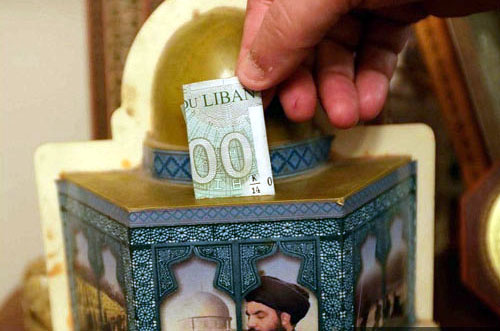FPI / June 26, 2019
Less than two years after Forbes declared it the richest terror group in the world, Hizbullah is strapped for cash amid U.S. President Donald Trump’s sanctions which have crippled the economy of Iran, the organization’s main benefactor.

The revenue stream from Iran has been cut so drastically, in fact, that Hizbullah has resorted to setting up tip jars in Lebanese grocery stores, according to U.S. Special Representative for Iran Brian Hook.
“In March, Hizbullah’s leader, Hassan Nasrallah, went on TV and made a public appeal for donations. Hizbullah has placed piggy banks in grocery stores and in retail outlets seeking the spare change of people,” Hook, senior policy adviser to Secretary of State Mike Pompeo, told the House Foreign Affairs Subcommittee on the Middle East and International Terrorism on June 19.
On June 4, Breitbart News learned from the Long War Journal that Iran-backed Houthi rebels in Yemen recently launched a fundraising campaign for Hizbullah after the U.S. sanctions limited Iran’s ability to continue funding the Lebanon-based terror group.
In January 2018, Forbes said Hizbullah had an annual income of $1.1 billion, making it the wealthiest terrorist group in the world. Most of that income at the time of the designation came primarily from “aid funding from Iran, drug manufacture, and trade.”
Hook told the House panel on June 19 that “Today by nearly every metric” the Iranian regime “and its proxies are weaker than when our pressure began. … Our pressure campaign is working. It is making Iran’s violent and expansionist foreign policy cost prohibitive.”
Iran has also told its proxies in Iraq, which include the Baghdad-sanctioned umbrella organization known as the Popular Mobilization Forces, “that they need to start looking for new sources of revenue,” Hook said.
“Shia militant groups in Syria have stated that Iran no longer has enough money to pay them as much as they have in the past,” Hook added.
The Trump sanctions have also made it difficult for Iran to expand its military capabilities, Hook said:
“Beginning in 2014 when the [nuclear] deal was near completion Iran’s military budget increased every year through 2017. When we put our pressure into effect starting in 2017 to 2018 in the first year we saw a reduction in Iran’s military spending by 10 percent and in March their most recent budget has a 28 percent cut in defense spending and that includes a 17 percent cut for IRGC [Iran’s Islamic Revolutionary Guard Corps] funding.”
In April, Trump sanctioned the IRGC and officially named it a foreign terrorist organization.
Hook acknowledged that, even with limited economic resources, Iran remains a threat.
Full Article . . . . Current Edition . . . . Subscription Information
Intelligence Brief __________ Replace The Media
